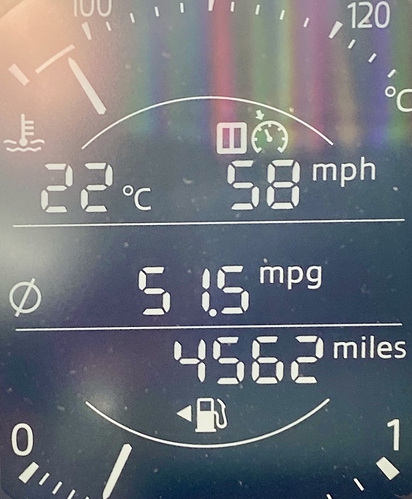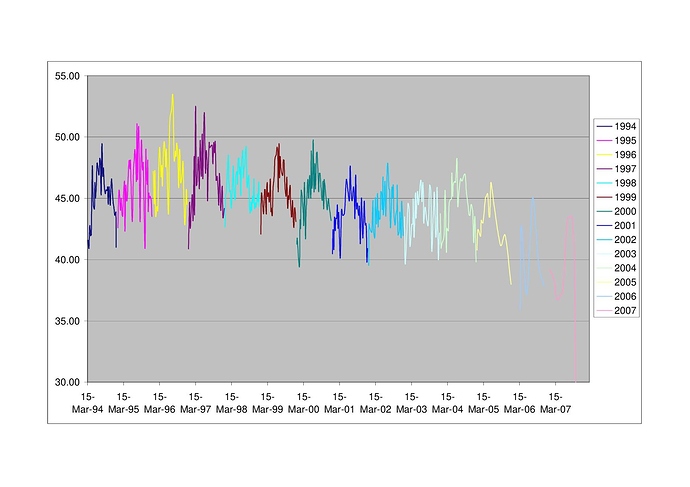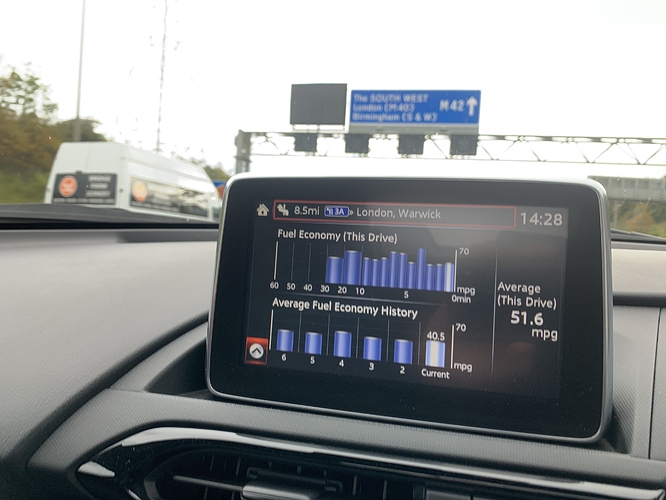As an average daily, maybe. But this is about a single journey at a consistent speed. I get mid-40’s at steady A-road speeds with stock and advanced timing. Even day-to-day I do much better than 30.
I was surprised when me and the boy had a track day at Thruxton, and had enough fuel to get back onto the A34 
I just fill mine up when the fuel gauge gets to 1/4 full, mpg is not important with an MX5, if it is the car needs to be sorted, or you need to be driving something else.
Well…My motorway drive was at speeds between 52 to 65mph.
6th gear. Majority of the drive was mid to ‘high’ 50’s. Gentle acceleration.
The way the car can deliver instant performance the rest of the time,
has me too scared to check the current MPG! 
41 is the best I’ve ever had in my mk3.5. That was over 3 weeks touring Spain. How anyone could get 50+ is beyond me.
I think you’ll find that most (if not all) those getting high mpg figures are driving Mk.4’s on which high mpg was one of their major selling points. Even doing very short runs “energetically” on mine I can’t get less than 43mpg in the 2.0l and 46mpg in the 1.5l, so driving “sensibly” on decent size runs 50mpg on either would be a doddle.
Well my figure is a bit artificial. I reset the MPG trip as I joined the
motorway, while at 55 mph. And monitored it right up to when I left
the motorway. Zero braking and minimal acceleration. I’d like to
crack 50 MPG on a motorway run. I can’t think of anything more
interesting to do in an MX-5 on a motorway… 
Took a picture as I couldn’t believe it. I was driving back from Weston Super Mare, roof down with a 52 inch TV strapped to the hood behind me. Got home 200 plus miles round trip.
It has always puzzled me why more recent cars so often have such poor mpg when one looks at how extremely efficient the engines are and how low the drag factors. It can only be how people drive them!
Our old 1951 Morris Minor did 50+mpg, admittedly very slowly, but it was a dreadfully inefficient engine.
The subsequent 1961 Wolseley 1500 also averaged around 50mpg for the ten years my Mother had it, a much faster car, but still an old fashioned B series engine with the notorious SU carburetter and my Dad always wanting to fiddle with it. This economy was useful during fuel rationing in sanctions-hit Rhodesia.
More recently my old 1.4 Astra was much more efficient, the engine producing as much power (85bhp) as my old 2.5 straight six Zodiac, and having similar performance, except the Zodiac always did 18 to 20mpg.
Here is the spreadsheet showing how economical the Astra was during its 205K life, cradle to grave. Each dot on the chart is a fill, usually at between 400 (winter) and 450 (summer) miles. It gets worse with time because I drove a bit faster in the later years simply because of being able to choose a better commute time on the M25, and it is obvious where I started working from home half the time (late 2003), and then retired in June 2005.
Key points about that Astra. Multi-point fuel injection, ABS, Central locking, RDS radio, all extra cost options I insisted on. Top was geared at 25mph per 1000rpm, peak torque at 3000rpm so 75 was its most efficient speed, although 100 was easy. No power steering, it did not need it, even having a friction damper to load the rack. No air-con, instead it had a leaky sunroof.
I used to reckon that the winter motoring was 5mpg worse on fuel economy than the summer, mostly because of needing lights and HRW and rich mixture to heat the cat.
So why is our much more efficient Mazda3, two decades more modern, lower CD, similar weight and much higher gearing worse on fuel economy?
because they are tuned for low emissions not for minimising fuel consumption
means less CO2 (hence tax bands) which should equate to better fuel economy.
But what does that really mean?
The pollution readings on the MOTs for the Astra are not all that much different from the Mazda3.
You get a greater percentage of nitrogen-based pollutants when the engine burns a weaker mixture
I guess I am doing something wrong (or right…) as I seem to average ~36mpg in my 2.0L Mk4, or maybe I am just not very sensible 
I usually get ~320miles before the dash informs me I have to fill up yet I only seem to ever fill up 40L when the tank is stated as being 45L so I am guessing they are very conservative with the reserve fuel level 
Agreed, but I thought the Mazda3 would be even weaker still.
However when comparing its most recent MOT emission test, the Mazda3 is significantly worse on the HC and CO outputs, worse than its first couple of MOTs, and worse than the NC.
Oh well.
I regularly get 45mpg out of my mk3 with the auto gearbox unless I get a rush of blood to the head and drive like the boy I left behind some years ago! I once tried a gentle run up to friends near Cockermouth and got a shade under 46mpg but it was difficult to be well behaved on Whinlatter Pass…
I’m not sure I’d have the patience to record and graph all those fillups but it’s interesting to see. I wonder if fuel grade / composition changed over time and if that also contributes to the apparent downward drift. I’d guess engine wear is also a factor. My mk 2.5 1.6 does around 30 mpg on the road and (on the the one time I checked it) around 15 on track. I’ve never checked my 1.8 mk 2.5 - a project for the future!
There are so many parameters which influence real mpg, most of them are pretty obvious. It’s only when a large amount of mpg data is gathered that conclusions can be drawn for any particular make and model. There will clearly be considerable overlap between vehicles, including of course the different mx-5 models - as evidenced from members feedback. There are a number of websites (honestjohn.co.uk is one) that collate mpg statistics from drivers and estimate average, best and worst. This is probably the best way of getting a handle on real mpg for any car (including mx-5s). I’m more than happy with the mpg I’m getting from my 1.5 ND but am not fanatical about it and don’t go to the trouble of recording it. I’m just aware that I get plenty of miles and smiles per tank of fuel… 
Mk3.5 I seem to average around 35 which I thought was quite reasonable given that it’s a 2.0 petrol and not one of the new direct injection engines.
When using a PC for hours at a time every day, half a minute once a week to open Excel and add the data is nothing. It can also be useful as a diagnostic of general condition.
On our other car in the early 1990s it showed up a binding brake when the tankful suddenly only went 80% of the distance; SWMBO had not noticed she needed more right foot and the steering was pulling left and assumed a 20 year old car got tired…


